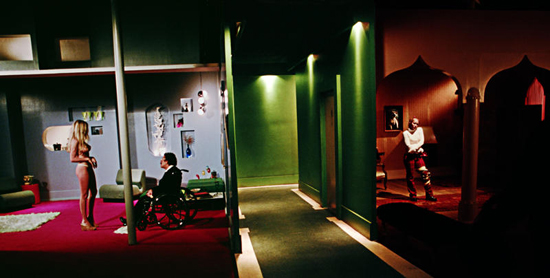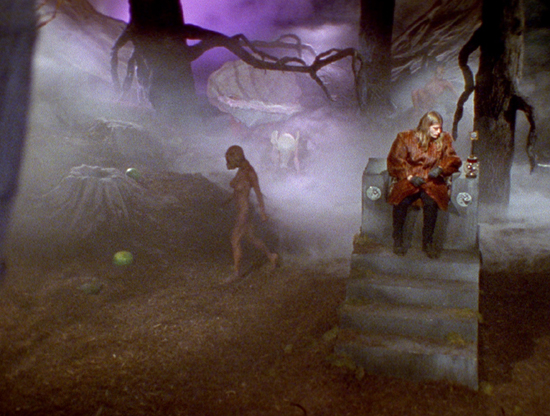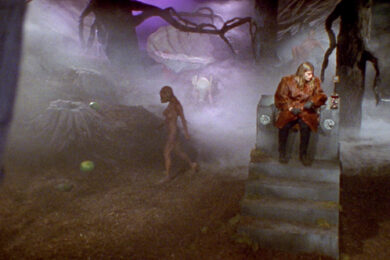With minimal pageantry and feigned awkwardness, Crispin Glover takes to the stage at the Phoenix cinema as his most intriguing and best loved character: Crispin Glover. He resembles an anxious travelling salesman in his black suit. Lit by a single red spotlight, he narrates and gesticulates through eight of his illustrated stories with brilliant comedy timing. The books themselves, which he discovered in old junkshops, date roughly from the end of the 19th to the early 20th century. By editing out large parts of the original text and adding illustrations and photos, he creates new narratives that end up quite different to those originally published. Each story skips off with jittering energy and juts with whimsical vagrancy in apparently random directions as if each scene or chapter were linked merely by the performance’s eccentricity. In conversation, Crispin Glover’s thought pattern runs away on equally intriguing paths. Yet, mirroring his stories, when you’re sure his train of sense left the track long ago and is now plummeting into a chasm of obscurity, he suddenly unveils some broader insight and purpose.
These tours are partly to recoup the money spent making the films which Crispin Glover funds himself, also why they’re not available on DVD – to see the film you have to pay to go and see it. Following the performance is a screening of It Is Fine! Everything Is Fine, the second part of the trilogy Crispin Glover began with Steven C. Stewart, who died of cerebral palsy related complications soon after they completed filming. As the central character Paul, Stewart launches on a cathartic quest to exorcise a lifetime of sexual aggression. Its Lynchian surrealism smudges the lines between black comedy, graphic sexual content and camp violence so that it’s near impossible to second guess what the acceptable response should be – as a disordered and confused tribune of social standards fight to suppress the gag reflex to laugh. This is clearly one of the intentions of the film, though. As puzzling as it is brilliant, It Is Fine! Everything Is Fine isn’t easy viewing, yet there are the briefest glimpses into why Crispin Glover considers it the best film he’ll ever make.
The week before at the BFI, Crispin Glover sits neatly and cheerily in an armchair, his frantic energy bubbling enthusiastically under the façade of calm and piercingly bright eyes beaming sincerity and charm. He speaks with measured conviction yet, despite his digressions, is rarely indulgent. Rather, his alertness resembles that of a small bird constantly querying the space around him. The Quietus spoke to him about his experience making these bizarre films and the reasons behind his acting decisions.
Do you think you’re typecast as eccentric characters or is it something you bring to a role yourself?
Crispin Glover: It’s a complex thing. OK, after Back To The Future made a lot of money, I felt an obligation to find material that psychologically reflected what my interests were. And the first movie I acted in after that was River’s Edge. When I did River’s Edge, I played the character as it was written, in that I said all of the words that were written. But what I did was to change the intention of the character. I made the character interested in what people thought about him, and wanted people to look well upon him. The way it was written was with a sincere intention, which felt a lot more – for want of a better word – normal. Had I played that character with a normalised intention, I would probably be viewed in a certain way as a more standard leading man, so to speak. I have no regrets about it, but if I had made the ‘normal’ choice, maybe there would have been more normal film offers. People would have thought, ‘Oh he’s the normal leading man character, lets offer him this part.’ What’s tended to happen since then is that people think I’m not a normal person.
Would you prefer to be offered more ‘normal’ characters?
CG: I would prefer to get offers for characters that are just interesting characters and not worry about whether they’re normal or not normal and then make the choice. What I try to do is make the choice that seems appropriately psychologically effective for that role which is going to work within the film. Now Charlie’s Angels, they said they wanted the character to be played as an albino, whatever that means: it’s a physical look! I didn’t want to do it though as I thought it seemed derivative.
What attracted you to Steven C. Stewart’s script for It Is Fine. Everything Is Fine?
CG: When I read that script in 1987 there was an emotional catharsis with Steven C. Stewart’s character that was very solidly in the screenplay; what I’m proudest of in the film is how much emotional catharsis is in the movie. I knew if I wrote What Is It?, Steven’s film could be made into a sequel of sorts. In 1999 one of Steve’s lungs collapsed and it became apparent that if we didn’t shoot something soon we were never going to shoot anything at all. We shot the film in six months and within a month of shooting, Steve died. I got a call one morning when Steve was in hospital, he was basically asking permission to take himself off life support if we had enough footage to finish the film. It was, of course, a sad day and a heavy responsibility to let me know that we did have enough footage. I know that if I said to Steve we didn’t have enough footage, he would have been there on set with a great attitude. When the whole trilogy’s done, …Everything Is Fine will be the best film in the trilogy; not only that, …Everything Is Fine will be the best film I’ll have anything to do with in my whole career. Then again, I’m really passionate about that film.

Due to the subject matter, was it difficult to get funded and made?
CG: The corporation I went to after David Lynch had agreed to produce It Is Mine [the planned third film in the trilogy] had questions. They said, ‘Well, we don’t know that we want to fund a film where the majority of the characters are played by actors with down syndrome’ and I was thinking it was about the viability, and this is why I started to make What Is It?, to promote this idea. I wrote this screenplay whereby the majority of the characters are played by actors with down syndrome.
Were their reservations to do simply with viability or other deeper concerns?
CG: I realised that the corporate entity was not reacting to the viability of having the majority of the characters played by actors with down syndrome, but it was the concept that the characters they were playing did not necessarily have down syndrome – was something that could raise questions. I don’t think there’s anything wrong with it, but people could say, ‘What are you doing? Are you exploiting these people?’ It sounds like it shouldn’t be that way, but it is. And I realised another word for this is ‘taboo’; it was a taboo subject. And I realised that as I expanded the film, that’s what What Is It? needed to focus on.
Is the problem with taboo to do with taste or decency?
CG: In the last 30-years or so, it [has been] necessary to get rid of that taboo or that film will not be corporately funded or distributed. I think this an exceedingly negative thing, because it’s that moment when an audience member sits back in their chair and looks up at the screen and thinks to themselves, ‘Is this right what I’m watching?’; ‘Is this wrong what I’m watching?’; ‘Should I be here?’; ‘Should the filmmaker have done this?’; ‘What is it?’ – which is the title of the film. What is it? – that’s taboo in this culture? What does it mean when the taboo has been rigorously exercised? When people are asking questions, that’s when there’s genuine education and to have a lack of genuine education in one of the most important forms of communication in the culture is extremely negative. The other word for ‘lack of education’ is propaganda. That is what I feel about the majority of what’s happening in the culture. It hasn’t always been that way. I think there have been times in the 60s and 70s, when I was entering the film business as a teen, I was thinking this is the kind of stuff I want to be acting in.
What kinds of films were these?
CG: Stanley Kubrick’s a great example: 2001: A Space Odyssey, A Clockwork Orange. What’s interesting is that Kubrick was an example of someone who was working specifically in the most corporate film community, but his films are still some of the most remarkable, cinematic, questioning films ever made, and that’s not what’s happening right now. There are things that have happened in the culture: specifically in the 60s and 70s there was the Vietnam War and, growing up at that time, I remember all of the imagery: that little girl running down the street with napalm burns – terrible images. And you’d see this stuff on television. The U.S. Government learned that this stuff would cause a lot of protest among citizens, so the next time a war came around at least, that was all gone; it was very well controlled.
Now, this is not the same as what happened with the corporate interests in the media world, but it’s related. In his book Propaganda, Edward Bernays came up with the word combination ‘public relations’ to replace the word ‘propaganda’. The book isn’t written as an exposé about propaganda, but an application of propaganda in the United States. Edward Bernays is the nephew of Sigmund Freud. The reason the concepts of Freud were brought over to the U.S. was because Edward Bernays knew that his uncle’s ideas on the subconscious could be utilised for the public relations industry, for the U.S. government and for corporate interests to get the masses to feel as though they’re doing what’s in their own best interests, but in fact actually only serve the interests of the elite – that is what Propaganda is written for. What’s fascinating about the book is that it’s not a secret, it’s not an exposé, it’s a guideline of how to propagandise U.S. culture for U.S. corporate and government interests! All of those things he’s suggesting in the book have heavily been put into place. I’d already had that feeling before hand but it’s so specifically laid out in the book. [For more on this, see Adam Curtis’ excellent documentary Century of the Self – Ed.]
Is the theme of the trilogy to challenge the idea of taboo?
CG: I realised that the central theme of What Is It? was that basically anything that is taboo has been cut out and questions weren’t being raised because, much like the U.S. government realised, the business interests that are at the head of the media organisations realised that if they continued to make movies that were causing people to ask questions, ultimately people would end up asking questions about corporate heads and about corporations, which would be bad for them. They don’t want to be funding stuff that causes an educated culture. So I realised there’s a very specific reason that in the 80s, which is the time I started filmmaking, that films stopped asking certain kinds of questions. So it’s best to fund films that don’t ask questions, don’t let people ask questions or don’t cause people to ask questions or, even better, make people feel that what the corporate interests are doing is good for them. So really, it’s very rare for me to watch a film just for entertainment now because I see this kind of propaganda.
You’ve starred in Alice In Wonderland, Hot Tub Time Machine, Charlie’s Angels and the sequel. How do you balance your beliefs about corporate film with acting in these films?
CG: What I realised in doing Steve’s film is that I needed to switch the way I thought about acting in film, and I did. Starting in the year 2000, I now think about acting as a craft as opposed to an art, so I distanced myself from the content of the films. That’s been a very important distinction for me to make. So if I think about it that way, and realise the very specific elements in what’s involved in calling it propaganda, it is weird because… in some way I feel a little weird about partaking in propaganda, but if I did that I wouldn’t have a career, I would have to live as a starving artist. And also I want to fund my films so I have to differentiate it and say ‘this is a craft’. When I think about it that way: that there’s this thing that I’m good at that I can use to help other filmmakers do what they want to do, I can just divorce myself emotionally from the content of the films. I also wanted to fund my films. That has made me feel much more positive about working in the industry, I’m much more grateful because it enables me to fund the films that I’m so passionate about. And I have a good time working on all these films.
Do you consider yourself an artist when you’re directing?
CG: Yes, filmmaking is my passion and that is where I put my whole artistic sensibility. It actually didn’t make sense to think of the acting as me influencing the film, and the film being my art; it’s impossible. As an actor that’s not what you’re supposed to be doing. I did not like it and it wasn’t fun for me when I was being constantly disappointed in the product. Not always, I was glad to be in films, but still they weren’t what my true passion was, my true whole passion is when I make these films.
Did you almost have to become a director to satisfy your artistic sensibilities?
CG: When I stepped into the industry as an actor when I was 18, I thought I was stepping into an industry that wanted to ask questions. If that’s what state the industry was, that would be great. If all of the studios and filmmakers thought they had to make films that ask questions, and I was an actor involved in that, I would be totally into that; that would be great. But that’s not the state of the industry. So it isn’t that I necessarily have to be a director, it’s that I want to be involved in a product that asks questions. And there are some films that come out, I’m not saying no films come out that ask questions, but it’s very rare, it’s so rare that if was to make a living out of it, it would be suicide.
Do you have particular inspirations behind your book and filmmaking?
CG: The books and films I’ve made have been reactive. It’s less about who’s inspired me as opposed to reacting to things. What Is It? was a reactive film. Steven C. Stewart was reacting to something, I related to that reaction, and there are thematic similarities to my own interests.
The two films in the trilogy are somewhat unusual, is your approach to directing also unconventional?
What Is It? and …Everything is Fine are very different types of films. Though other people might see them as unconventional, for me, the syntax structure of filmmaking is similar to an early Buñuelian syntax, which is a specific kind of syntax, but it’s not a new syntax. I wouldn’t say that What Is It? is going into new territory; what I would say is that it’s reacting to the constraints that have happened over the past 30 years. I’m utilising a similar syntax that Buñuel was utilising in the 1920s when he was making L’Age D’Or. When Buñuel was making L’Age D’Or he was reacting to a ‘stronghold’ situation in his culture. He was working in a Catholic culture and the film is reacting to the Catholic culture. Similarly, What Is It? is reacting to imagery in this culture. That’s why the syntax that Buñuel was using at that time was important. It’s poetic: you can say certain things poetically when it’s reacting to strong influences which if you state them outright, people would get really angry. People do still get angry with What Is It? But even that is poetically stated, so it’s not stated in the other syntax that we’re used to, …Everything Is Fine is in that syntax. So neither …Everything Is Fine or What Is It? are breaking ground in their directorial or story-telling elements, I’m using standardisations that have been around for over a hundred years in both the films, in a number of ways – it’s just that right now the film culture is extremely corporate and there are taboo elements that we’re not supposed to be dealing with.



